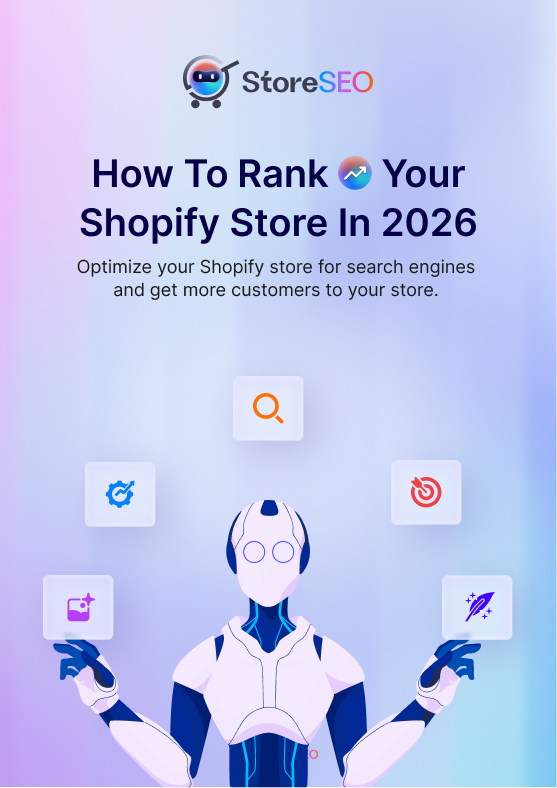In der E-Commerce-Branche zählt der erste Eindruck mehr als alles andere. Wenn potenzielle Kunden Ihren Shopify-Shop besuchen, sind Bilder oft das Erste, was ihnen auffällt. Sind Ihre Bilder so optimiert, dass sie fesseln und begeistern? Richtig optimierte Bilder können das Benutzererlebnis erheblich verbessern, die Ladezeiten verkürzen und das Suchmaschinen-Ranking Ihres Shops steigern. In diesem Leitfaden zur Bildgröße bei Shopifyerfahren Sie, wie Sie Ihren Shopify-Shop durch Bildoptimierung verändern und ihn schneller, effizienter und attraktiver für Ihr Publikum machen können.

Grundlegendes zu den Bildanforderungen von Shopify
Wenn Sie Ihren Shopify-Shop einrichten, ist es wichtig, den Shopify-Leitfaden zur Bildgröße und seine Anforderungen zu verstehen. Bilder sind nicht nur dekorativ; sie sind ein wichtiger Teil der Funktionalität und des Benutzererlebnisses Ihres Shops. Lassen Sie uns einen Blick darauf werfen, was Shopify erfordert und warum diese Anforderungen wichtig sind.
Allgemeine Richtlinien
Shopify ermöglicht Ihnen das Hochladen von Bildern mit einer maximalen Größe von 4472 x 4472 Pixeln. Das ist recht großzügig und ermöglicht es Ihnen, Ihre Produkte sehr detailliert zu präsentieren. Die empfohlene Größe für quadratische Bilder beträgt jedoch 2048 x 2048 Pixel. Diese Größe schafft ein Gleichgewicht zwischen Qualität und Leistung und stellt sicher, dass die Bilder scharf aussehen, ohne Ihre Site unnötig zu verlangsamen. Darüber hinaus beträgt die maximale Dateigröße für Bilder 20 MB. Es ist wichtig, die Dateigrößen unter dieser Grenze zu halten, um schnelle Ladezeiten und ein reibungsloses Benutzererlebnis aufrechtzuerhalten.
Warum die Bildgröße wichtig ist
Die Bildgröße wirkt sich direkt darauf aus, wie schnell Ihre Webseiten geladen werden. Große Bilder können Ihre Site erheblich verlangsamen, was zu einer schlechten Benutzererfahrung führt. Besucher verlassen die Seite wahrscheinlich, wenn das Laden zu lange dauert, was Ihre Konversionsraten beeinträchtigen kann. Daher ist die Optimierung der Bildgrößen entscheidend für die Aufrechterhaltung einer schnellen und reaktionsfähigen Site.
Einfluss des Shopify-Leitfadens zur Bildgröße auf SEO und Suchmaschinen-Rankings
Suchmaschinen wie Google betrachten die Seitengeschwindigkeit als Rankingfaktor. Große, nicht optimierte Bilder können Ihre Website verlangsamen und sich negativ auf Ihre SEO auswirken. Richtig dimensionierte und komprimierte Bilder können die Sichtbarkeit Ihrer Website in Suchergebnissen verbessern, indem sie schnellere Ladezeiten gewährleisten. Darüber hinaus kann die Verwendung beschreibender Dateinamen und Alternativtexte Ihre SEO verbessern, indem sie Suchmaschinen dabei helfen, den Inhalt Ihrer Bilder zu verstehen.
Optimale Bildgrößen für verschiedene Shopify-Elemente
Wenn Sie Ihren Shopify-Shop einrichten, ist die Wahl der richtigen Bildgrößen für verschiedene Elemente entscheidend, um ein optisch ansprechendes und effizientes Einkaufserlebnis zu schaffen. Lassen Sie uns die optimalen Bildgrößen für verschiedene Shopify-Komponenten untersuchen.

Produktbilder
Für Produktbilder, die empfohlene Größe beträgt 2048 x 2048 Pixel. Diese Größe gewährleistet eine hohe Auflösung und ermöglicht die Zoomfunktion, die für Kunden wichtig ist, die Produktdetails genau prüfen möchten. Die Einhaltung eines Seitenverhältnisses von 1:1 ist wichtig, da dies für ein einheitliches und professionelles Erscheinungsbild aller Produktbilder sorgt. Diese Konsistenz trägt zu einem stimmigen Einkaufserlebnis bei und verhindert Verzerrungen oder Beschneidungsprobleme, die bei unterschiedlichen Seitenverhältnissen auftreten können.
Sammlung Bilder
Sammlungsbilder sollte idealerweise 1024 x 1024 Pixel groß sein. Diese Größe bietet ein perfekt quadratisches Seitenverhältnis (1:1), das auf verschiedenen Geräten und Shopify-Themen gut funktioniert. Die Einheitlichkeit von Größe und Seitenverhältnis verleiht Ihrem Onlineshop ein elegantes und professionelles Erscheinungsbild und erleichtert Kunden die Navigation durch die Produktkategorien.
Profi-Tipps zur Bildoptimierung im Shopify-Leitfaden zur Bildgröße
Bilder optimieren für Ihren Shopify-Shop ist wichtig, um die Website-Leistung zu verbessern, die SEO zu optimieren und ein nahtloses Benutzererlebnis zu bieten. Lassen Sie uns einige Profi-Tipps zur Bildoptimierung auf Shopify erkunden.
Komprimierung und Dateiformate

Die Wahl des richtigen Dateiformats und Bilder komprimieren effektiv sind wichtige Schritte bei der Bildoptimierung. Für Fotos ist JPEG das empfohlene Format, da es eine große Farbpalette unterstützt und auch bei Komprimierung die Qualität beibehält.
Für Grafiken, die Transparenz erfordern, ist PNG ideal, da die Bildqualität erhalten bleibt. WebP hingegen ist ein neueres Format, das kleinere Dateigrößen ohne Qualitätseinbußen bietet und sich daher hervorragend zur Verbesserung der Ladezeiten von Websites eignet.
Um den Komprimierungsprozess zu optimieren, können Tools wie StoreSEO kann unglaublich hilfreich sein. StoreSEO bietet einen erweiterten Bildoptimierer, der das Komprimieren und Ändern der Größe von Bildern vereinfacht und sicherstellt, dass sie für schnelles Laden optimiert sind, ohne an Qualität zu verlieren.
Beschreibende Dateinamen und Alternativtext
Die Verwendung beschreibender Dateinamen und Alternativtexte ist für SEO entscheidend. Dateinamen sollten relevante Schlüsselwörter enthalten, die den Bildinhalt beschreiben. Verwenden Sie beispielsweise statt eines allgemeinen Namens wie „IMG_1234.jpg“ etwas wie „rote-Lederhandtasche.jpg“. Diese Vorgehensweise hilft Suchmaschinen, den Kontext des Bildes zu verstehen und verbessert die Sichtbarkeit Ihres Shops in den Suchergebnissen.
Alt-Text oder Alternativtext dient einem doppelten Zweck. Er bietet eine Beschreibung des Bildes für sehbehinderte Benutzer und hilft Suchmaschinen, Ihre Bilder effektiver zu indizieren. Die Aufnahme relevanter Schlüsselwörter in Alt-Text kann Ihr SEO-Ranking erheblich verbessern. Ein guter Alt-Text für ein Produktbild könnte beispielsweise „rote Damenhandtasche aus Leder mit goldenen Akzenten“ sein.
Konsistenz im gesamten Store
Für einen professionellen Auftritt ist es wichtig, bei allen Bildern in Ihrem Shopify-Shop einen einheitlichen Stil und ein einheitliches Seitenverhältnis beizubehalten. Konsistenz trägt zu einem einheitlichen Erscheinungsbild bei, das das gesamte Einkaufserlebnis verbessert. Ob Produktbilder, Banner oder Social-Media-Symbole: Wenn Sie sicherstellen, dass alle einen einheitlichen Stil und ein einheitliches Seitenverhältnis aufweisen, vermeiden Sie visuelle Dissonanzen, die Kunden ablenken oder verwirren könnten.
StoreSEO: Das perfekte Tool zur Bildoptimierung für Shopify
Wenn Sie einen Shopify-Shop betreiben, wissen Sie, dass die Bildoptimierung entscheidend ist, um die Leistung Ihrer Website zu verbessern und Ihr Suchmaschinen-Ranking zu verbessern. Hier kommt StoreSEO als perfektes Tool zur Bildoptimierung auf Shopify ins Spiel. Lassen Sie uns untersuchen, wie StoreSEO hilft, was es tut und warum Sie es brauchen.
Verwenden Sie Apps wie StoreSEO für mehr Effizienz
StoreSEO wurde entwickelt, um den Prozess der Bildoptimierung zu optimieren und es Shopify-Shop-Besitzern zu erleichtern, ihre Bilder effizient zu verwalten. Eines der herausragenden Merkmale von
StoreSEO ist sein erweiterter Bildoptimierer, der Bilder automatisch komprimiert und ihre Größe anpasst, um die Ladegeschwindigkeit von Websites zu verbessern.
Dadurch wird sichergestellt, dass Ihr Shop schnell und reaktionsfähig bleibt und Ihren Kunden ein besseres Benutzererlebnis bietet. StoreSEO bietet eine Funktion für Alt-Texte für Bilder in großen Mengen, mit der Sie allen Ihren Produktbildern beschreibenden Alt-Text hinzufügen können. Dies ist entscheidend für die Verbesserung der Sichtbarkeit Ihres Shops in Suchmaschinen, da Alt-Texte den Suchmaschinen Kontext zum Inhalt Ihrer Bilder bieten.
Was StoreSEO macht und warum Sie es brauchen
StoreSEO geht über die einfache Bildoptimierung hinaus. Es enthält eine umfassende Suite von SEO-Tools, mit denen Sie die allgemeine Suchmaschinenleistung Ihres Shops verbessern können. Mit Funktionen wie der SEO-Analyse für Produkte, Seiten und Blogs bietet StoreSEO detaillierte Einblicke und Vorschläge zur effektiven Optimierung der Inhalte Ihres Shops.
Mit der App können Sie außerdem Metabeschreibungen, Titel und Schlüsselwörter verwalten, damit Ihre Produkte online leichter zu finden sind. StoreSEO unterstützt die Sitemap-Generierung, die das Crawlen und Indizieren der Seiten Ihres Shops durch Suchmaschinen verbessert.
StoreSEO hilft Ihnen dabei, indem es den Bildoptimierungsprozess automatisiert und vereinfacht, der ein Schlüsselfaktor zur Verbesserung der Seitenladezeiten und der Benutzererfahrung ist. Durch die Verwendung von StoreSEO können Sie sicherstellen, dass Ihre Bilder nicht nur auf Geschwindigkeit, sondern auch auf Sichtbarkeit in Suchmaschinen optimiert sind.
Dank der benutzerfreundlichen Oberfläche und des reaktionsschnellen Kundensupports von StoreSEO ist es auch für SEO-Neulinge zugänglich. Die App bietet umsetzbare Erkenntnisse und maßgeschneiderte Vorschläge, wodurch das SEO-Management unkompliziert und effektiv wird.
Wenn Sie diesen Blog nützlich fanden, dann bitte Abonnieren Sie unsere Blogs um über die neuesten Shopify-Trends und -Neuigkeiten auf dem Laufenden zu bleiben.










